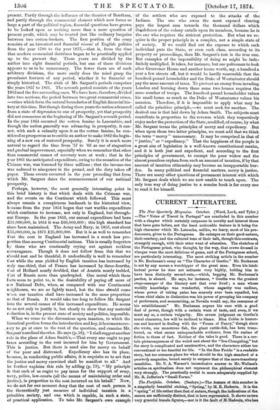CURRENT LITERATURE..
The New Quarterly Magazine. October. (Ward, Lock, and Tyler.) —The " Notes of Travel in Portugal" are concluded in this number with a chapter which certainly surpasses in novelty and interest those that have gone before, not the least noticeable feature in it being the high character which Mr. Latouche, unlike, we fancy, most of his pre- decessors, gives to the Portuguese. He enlarges on their good-nature, their courtesy, and the cultured tone of their talk, though this contrasts, strangely enough, with their utter want of education. The sketches of the Portuguese priest, who thought, by the way, that crows dressed in vinegar were the most delicious of game, and of the. Portuguese school, are particularly interesting. The most striking article in the number is Mr. Buchanan's essay on "The Character of Goethe." Mr. Buchanan is not by any means a worshipper of the great man. Even his intel- lectual power he does not estimate very highly,, holding him to have been distinctly second-rate,—which, begging Mr. Buchanan's pardon, is absurd. He says, for instance, " Goethe was the greatest stage-manager of the literary sort that ever lived ; a man whose worldly knowledge was wonderful, whose sagacity was endless, whose power of taking pains has scarcely ever been equalled, but whose chief claim to distinction was his power of grouping his company of performers, and economising, as Novella would say, the resources of his establishment" Mr. Buchanan argues his case with a good deal of power, though with a certain want of taste, and even, if we must say so, a certain vulgarity. His severe judgment on Goethe's moral character,• few will be inclined to blame. Miss. Cobbe is humor- ous and learned in dealing with the " Fauna. of Fancy," though since she wrote, one monstrous fish, the giant cuttle-fish, has been trans- ferred, on what seems unimpeachable evidence, from the realms of fiction to those of fact. Neither of the tales is good. There is a cer- tain picturesqueness of the weird sort about the "Sea-Changeling," but the story is complicated and unattractive, and the characters either too conventional or too fanciful for life. " In the Rue Froide " is a readable story, but too common-place for what should be the high standard of a quarterly magazine, bound surely to surpass that of the more transitory monthlies. Mr. N. A. Warner's inconclusive answer to Mr. Wallace's articles on spiritualism does not represent the philosophical element very strongly. The practically useful is more adequately supplied by Mr. R. Jefferies's " Small Farms."


































 Previous page
Previous page